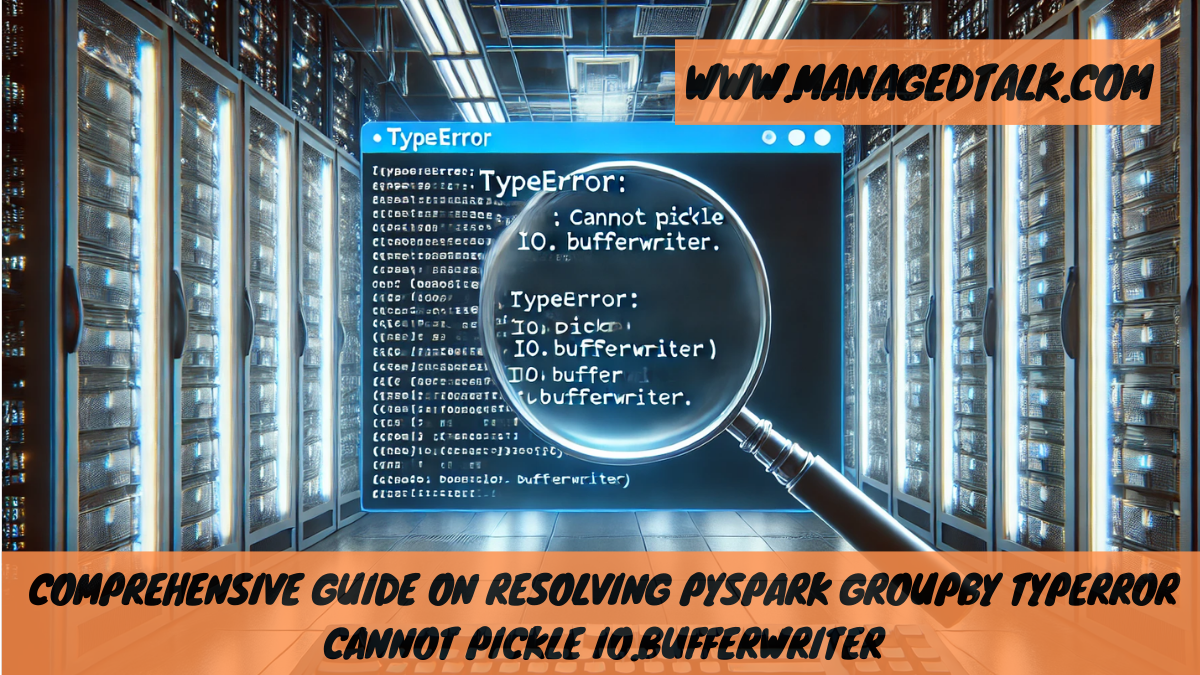Introduction to PySpark GroupBy Error
The error message “pyspark groupby TypError cannot pickle io.bufferwriter” can be a common roadblock for those using PySpark to manage large-scale data. This error typically appears when using PySpark operations, particularly during complex transformations that involve the groupBy method.
“PySpark groupby TypError cannot pickle io.bufferwriter arises from serialization issues involving unpicklable objects. To fix it, refactor functions and avoid non-serializable references in transformations.”
why this error occurs and how to resolve it is essential for maintaining smooth data processing in distributed computing environments.
Understanding PySpark and Its Core Functionalities
What is PySpark?
PySpark is the Python API for Apache Spark, enabling developers to harness the power of distributed data processing. It simplifies data analytics by supporting operations on large data sets across clusters.
What is groupBy in PySpark?
The groupBy function in PySpark allows users to group data based on one or more columns. This method is crucial for performing aggregation and analysis, making data processing more efficient.
Unpacking the Error: “TypeError: cannot pickle io.bufferwriter”
When users encounter the “pyspark groupby TypeError: cannot pickle io.bufferwriter,” it often indicates an issue with how PySpark handles serializing objects across distributed workers. Here’s a breakdown of the key terms:
- TypeError: This signals that an operation or function was applied to an object of inappropriate type.
- Pickle: Python’s module used to serialize and deserialize objects.
- io.bufferwriter: A built-in file object that handles byte buffering.
Why Does This Error Happen?
Serialization errors in PySpark often stem from trying to pass complex or unpicklable objects within transformations. For instance, when the code tries to pass an internal file-like object (io.bufferwriter) to a worker node, the Python pickle module fails to serialize it, leading to the TypeError.
Common Scenarios Leading to the Error
- Using Functions with Unpicklable Objects: Custom functions passed into transformations like
maporreducethat rely on objects such as open file handles. - Inappropriate Object References: Including references to resources like file writers or sockets within PySpark operations.
- Complex Function Logic: Multi-step operations that include external libraries or complex operations may inadvertently reference non-serializable objects.
Detailed Example to Illustrate the Issue
Consider the following code snippet:
from pyspark.sql import SparkSession
spark = SparkSession.builder.appName("GroupByExample").getOrCreate()
data = [(1, "apple"), (2, "banana"), (1, "grape")]
df = spark.createDataFrame(data, ["id", "fruit"])
# GroupBy operation that triggers the error
result = df.groupBy("id").agg({'fruit': 'count'})If you integrate certain functions that reference unpicklable objects in the groupBy transformation or agg, the error is triggered.
Steps to Resolve “pyspark groupby TypError cannot pickle io.bufferwriter”
- Refactor Custom Functions: Ensure that any function used in
map,filter, orreduceoperations does not reference unpicklable objects. - Avoid Non-Serializable Resources: Remove or avoid passing file handles, sockets, or similar resources to PySpark functions.
- Use PySpark UDFs Carefully: User-defined functions (UDFs) can often trigger this error if they include complex logic or external references.
Best Practices to Avoid Serialization Errors
1. Limit External References
Keep the code logic simple within PySpark operations. Avoid referencing global variables or external objects that are not serializable.
2. Utilize Broadcast Variables
If you need to share a large read-only dataset across nodes, consider using SparkContext.broadcast to broadcast the data, which avoids serialization issues.
3. Leverage PySpark’s Built-in Functions
When possible, use PySpark’s built-in functions like groupBy, agg, or select as they are optimized for distributed processing and do not require manual serialization.
Alternative Solutions
Switch to DataFrame Operations: Instead of complex RDD transformations that require custom functions, use PySpark’s DataFrame API. It’s optimized for SQL-like queries and reduces the likelihood of serialization errors.
# Using PySpark's built-in DataFrame operations
df.groupBy("id").count().show()Deploy Lambda Functions with Care: Avoid using lambda functions that depend on complex external states.
Practical Example of Fixing the Error
Here’s how you can refactor code to prevent this error:
# Avoid using unpicklable objects inside transformations
def process_row(row):
return (row.id, len(row.fruit)) # Keep it simple
# Apply function without passing unpicklable objects
result = df.rdd.map(process_row).collect()FAQs on PySpark GroupBy TypeError
1. What is the main cause of the “pyspark groupby TypError cannot pickle io.bufferwriter” error?
This error occurs when unpicklable objects, such as file handles, are referenced in PySpark operations.
2. How can I avoid serialization issues in PySpark?
Refactor functions to avoid unpicklable references, use broadcast variables for shared data, and prefer DataFrame APIs.
3. Can I use global variables in PySpark transformations?
It’s best to avoid using global variables directly within transformations, as this can lead to serialization issues.
4. What’s the difference between RDD and DataFrame operations in terms of serialization?
DataFrames are optimized for distributed processing and avoid many serialization pitfalls found in RDD operations.
5. Why does PySpark use pickle for serialization?Pickle is used to serialize Python objects so that they can be transmitted to different worker nodes. However, it cannot handle all object types.
Conclusion
Encountering the “pyspark groupby TypeError: cannot pickle io.bufferwriter” can be frustrating, but with a clear understanding of how PySpark handles serialization and object types, you can refactor your code to avoid these issues. By following best practices and simplifying your transformation logic, you can optimize your PySpark operations for smoother performance.
